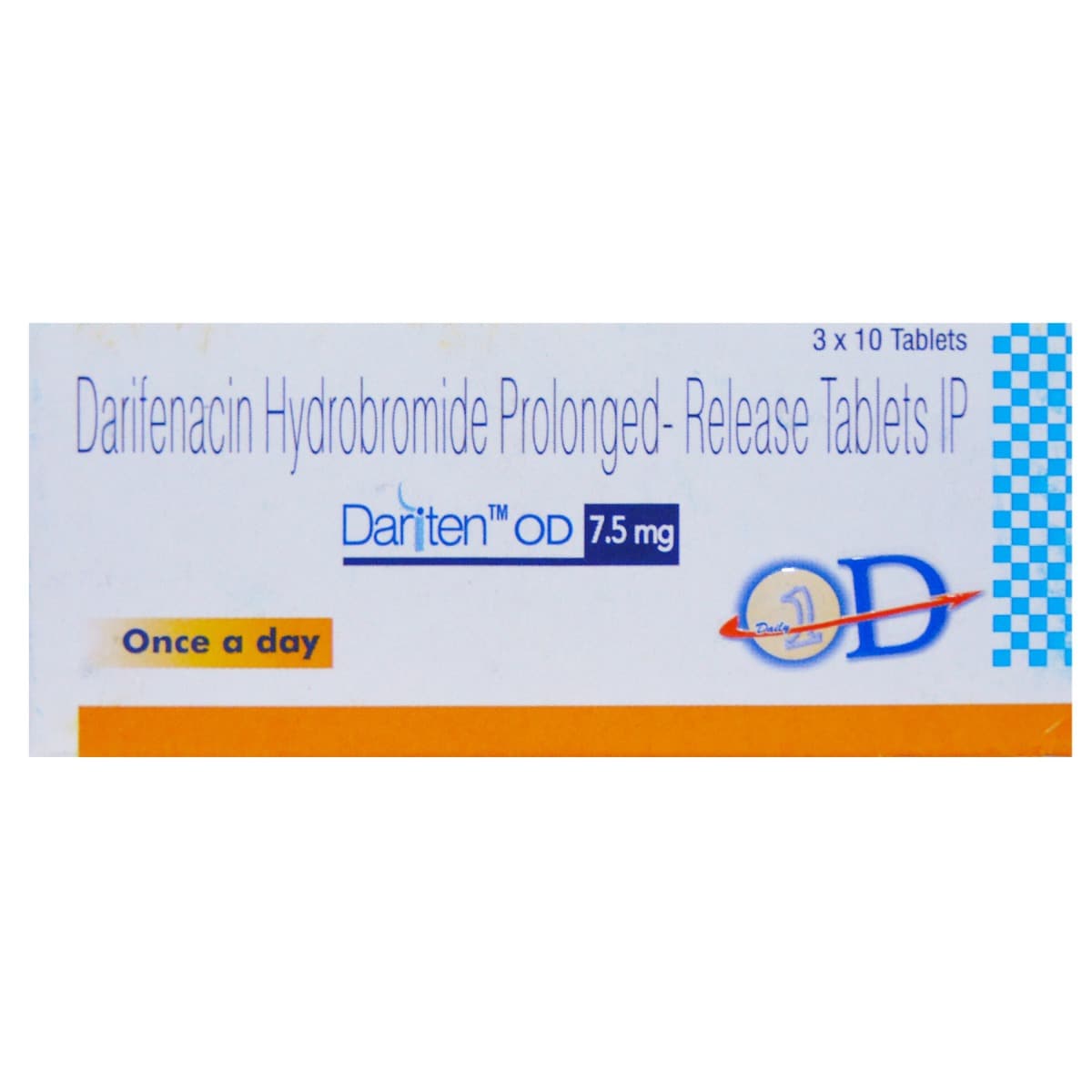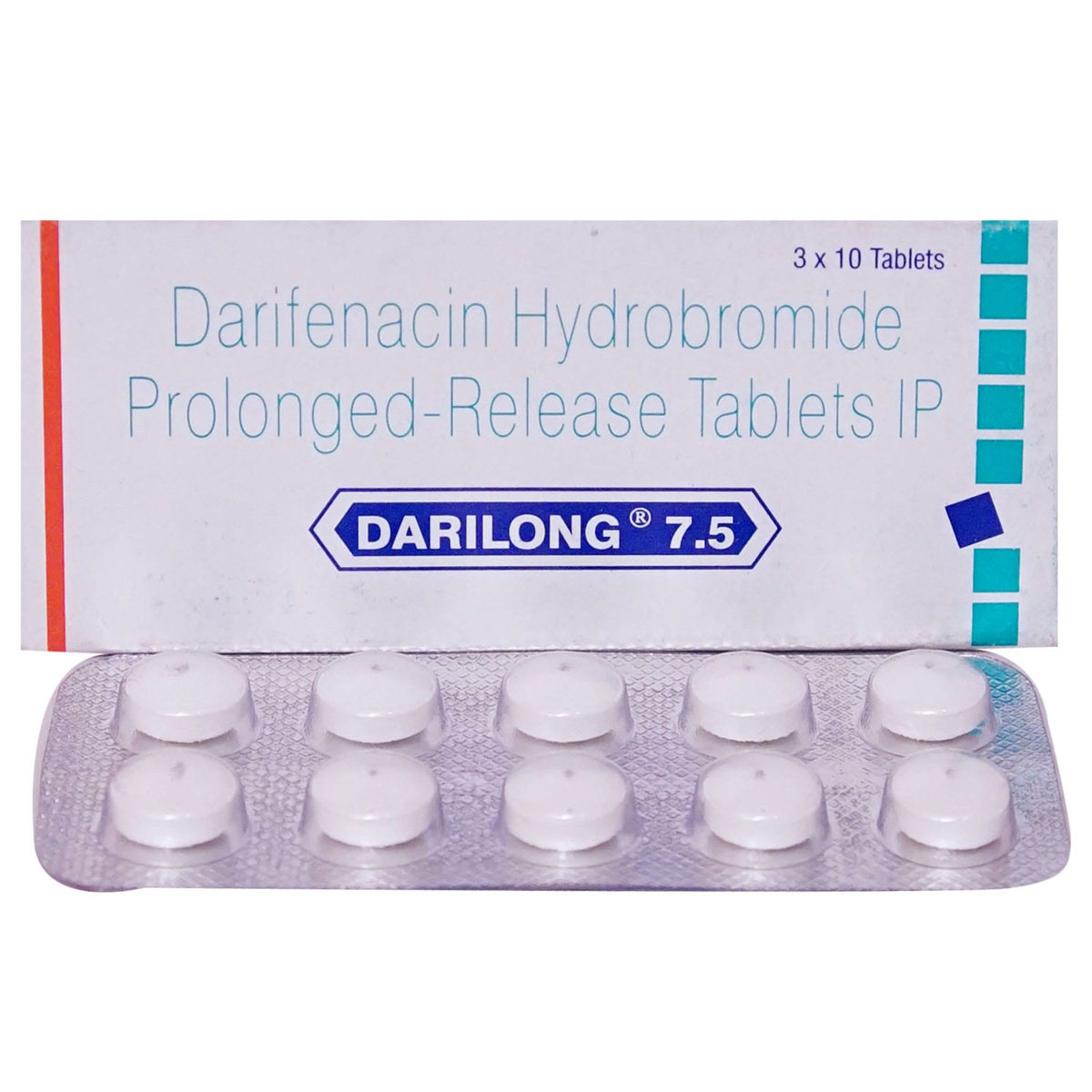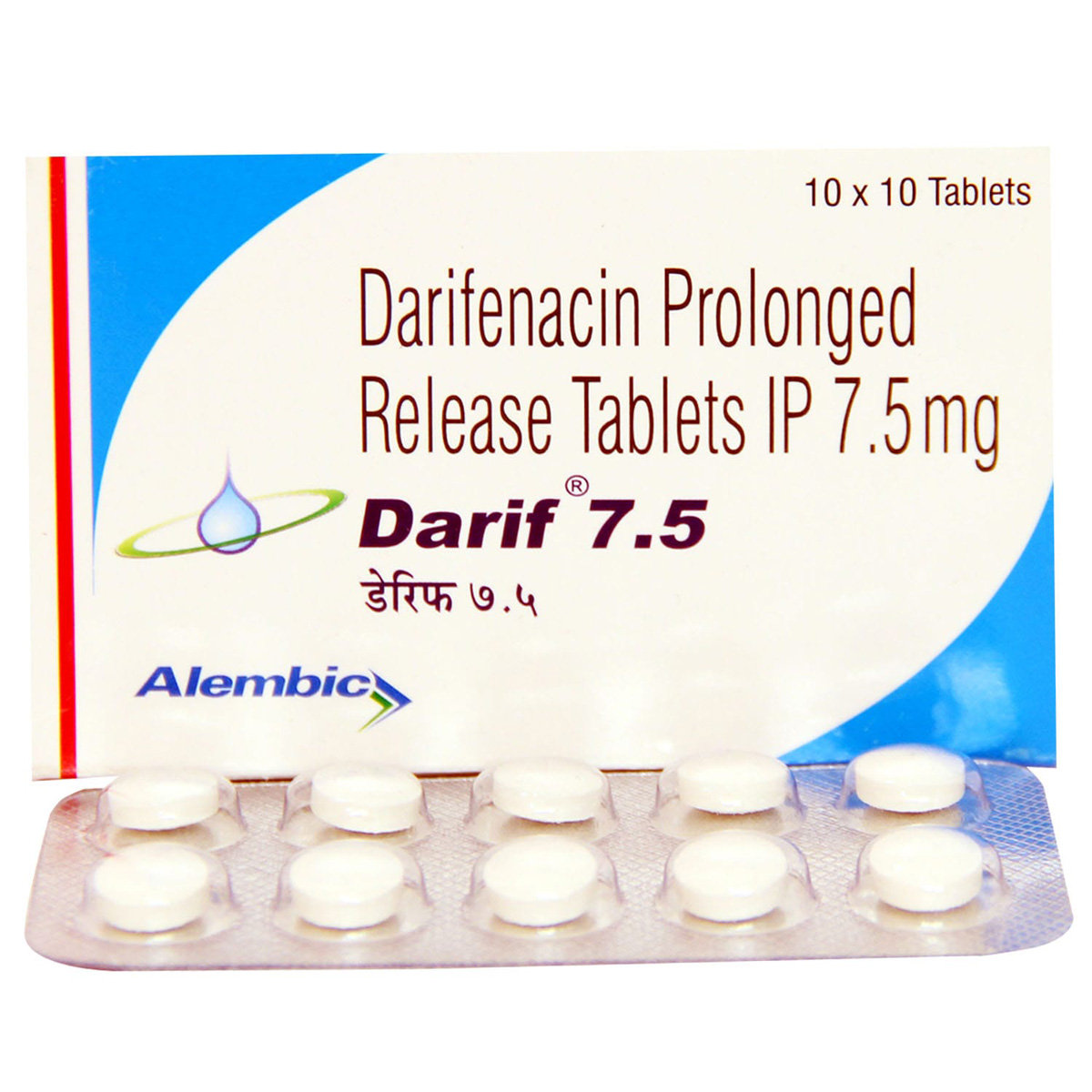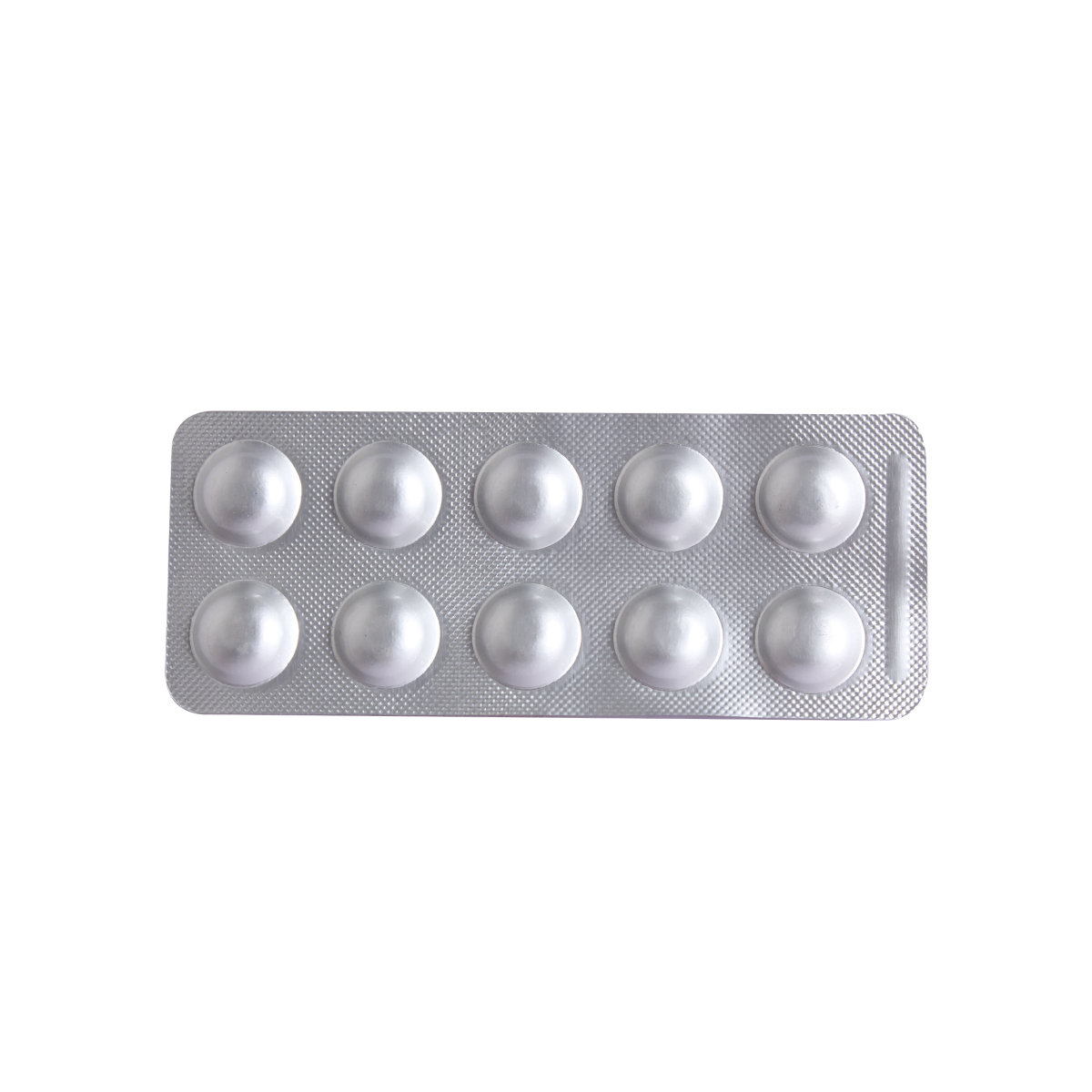Darifenacin
About Darifenacin
Darifenacin belongs to the group of medications called ‘antimuscarinic' or 'antispasmodics' primarily used in the treatment of overactive bladder (OAB) symptoms. Overactive bladder is a condition in which the urinary bladder muscles constrict uncontrollably thereby causing an urgent need to urinate, frequent urination, and inability to control urination.
Darifenacin contains ‘Darifenacin’ that relaxes the urinary bladder muscles which in turn decreases the activity of the overactive bladder. In an overactive bladder, muscle contractions occur before the full expansion of the bladder causing the patient to have frequent urges to urinate. Darifenacin stops these sudden contractions of urinary bladder muscles thereby enabling control over urination. Thus, it increases the amount and volume of urination that can be held by your bladder.
Take Darifenacin as prescribed by your doctor. You are advised to take Darifenacin for as long as your doctor has prescribed it for you depending on your medical conditions. You may experience dryness in the mouth, constipation, nausea, blurred vision, indigestion, and headache. Most of these side effects of Darifenacin do not require medical attention and gradually resolve over time. However, if the side effects are persistent, reach out to your doctor.
Before starting Darifenacin, please inform your doctor if you have any allergy with this Darifenacin or any other medicine or any type of foods. Talk to your doctor if you have glaucoma, liver disease. If you have trouble passing urine or slow clearing your stomach, then inform your doctor. Do not start, stop, or change the dose of Darifenacin without checking with your doctor. Inform your doctor if you are pregnant or plan on becoming pregnant. Inform your doctor if you are breast-feeding. You will need to discuss any risks to your baby.
Uses of Darifenacin
Medicinal Benefits
Darifenacin contains ‘Darifenacin’ that belongs to the class of medications called 'anticholinergics' or ‘antimuscarinic’. It can decrease the activity of the overactive bladder. In an overactive bladder, muscle contractions occur before the full expansion of the bladder causing the patient to have frequent urges to urinate. Darifenacin can stop these sudden contractions of bladder muscles. It enables control over urination and increases the amount of urine that can be held by your bladder.
Directions for Use
Storage
Side Effects of Darifenacin
- Dryness in mouth
- Constipation
- Nausea
- Blurred vision
- Indigestion
- Headache
Drug Warnings
Before starting Darifenacin, please inform your doctor if you have any allergy with this Darifenacin or any other medicine or any type of foods. Talk to your doctor if you have glaucoma, liver disease. If you have trouble passing urine or slow clearing your stomach, then inform your doctor. Do not start, stop, or change the dose of Darifenacin without checking with your doctor. A very bad reaction called angioedema (swelling of the face, hands, eyes, lips, throat, tongue, or difficulty in breathing and swallowing) has happened with Darifenacin. Get medical help immediately if you have any of these symptoms. Sometimes, this may be life-threatening. Avoid driving and doing other activities that require concentration until you see how Darifenacin affects you. Inform your doctor if you are pregnant or plan on becoming pregnant. Inform your doctor if you are breast-feeding. You will need to discuss any risks to your baby.
Drug Interactions
Drug-Drug Interactions: Darifenacin may interact with antiviral medicines (amprenavir, atazanavir, boceprevir, indinavir), antipsychotic medicines (brexpiprazole), anticancer (ceritinib), medicines for HIV / AIDS (cobicistat), antifungal drugs (ketoconazole), idelalisib, ketoconazole, blood pressure-lowering pills (mibefradil), medicines used to treat brain disorder (donepezil).
Drug-Food Interactions: Do not take grapefruit or grapefruit juice while using Darifenacin.
Drug-Disease Interactions: Darifenacin should be used with caution in patients with urinary retention (inability to urinate), brain disease, liver disease, gastric problems.
Drug-Drug Interactions Checker List:
Safety Advice

Alcohol
cautionAvoid taking alcohol as it may increase the risk of dizziness.

Pregnancy
unsafeDarifenacin is a category C medicine. It should be used in pregnant women if the benefits outweigh the risks.

Breast Feeding
cautionDarifenacin should be used in breastfeeding mothers only if clinically needed.

Driving
cautionDarifenacin may cause dizziness and blurred vision and sleepiness. So, avoid driving or operating heavy machinery after using Darifenacin.

Liver
cautionDarifenacin should be used with caution in patients with liver diseases

Kidney
cautionDarifenacin should be used with caution in patients with kidney diseases.

Children
unsafeNot recommended for use in children below 18 years of age due to a lack of data on safety and efficacy.
Habit Forming
Diet & Lifestyle Advise
- Eat fresh fruits like pears, banana, citrus fruits, and green vegetables like beans and potatoes.
- Try to take cranberry juice as it helps in minimizing urinary infections.
- Avoid coffee, tea, and carbonated drinks that contain caffeine.
- Do not consume processed, fried, or spicy foods, as these foods can irritate your bladder. Limit alcohol intake as it can increase the risk of side-effects.
- Quit smoking and exercise regularly.
Special Advise
- Intake of Darifenacin can make you sweat less, thereby increasing the chance of having a heat stroke in summer. So, avoid doing tasks that may cause you to overheat.
- Intake of Darifenacin may occasionally cause blurry vision and dizziness so avoid driving a motor vehicle, operate heavy machinery, and performing hazardous tasks that require mental alertness as well.
Patients Concern
Disease/Condition Glossary
Overactive bladder (OAB): In normal conditions, when the urinary bladder is filled with urine, it sends a message to the brain that an individual is ready to urinate. During the urination process, bladder muscles contract which ultimately leads to a uniform flow of urine. Contrary to this, in an Overactive bladder (OAB), the urinary bladder muscles start contracting before the urine is filled in the urinary bladder, thereby causing frequent urges to urinate. Darifenacin prevents this sudden bladder muscle contractions and increasing the volume and amount of urine that the bladder can hold. Thus, Darifenacin helps to control the release of urine and helps reduce symptoms of OAB like a strong urge to urinate, frequent urination, and reduced urine flow.
FAQs
Darifenacin is used to treat an overactive bladder in which an individual is unable to control urination and always have a strong urge to urinate. Darifenacin prevents these sudden bladder muscle contractions and increasing the volume and amount of urine that the bladder can hold. Thus, Darifenacin helps to control the release of urine and helps reduce symptoms of OAB like a strong need to urinate, frequent urination, and reduced urine flow.
Darifenacin may cause blurred vision in some cases and may harm your thinking or reactions. Consult your doctor immediately if this condition persists or worsens while using this Darifenacin.
Darifenacin is used to treat symptoms of overactive bladder like sudden or frequent rush to the toilet or outflow of urine.
Antifungal medicine may interact with Darifenacin. So, inform your doctor about all the prescription and non-prescription medicines before taking Darifenacin to avoid unwanted effects.
Dry mouth is the most common side effects of Darifenacin, so you can drink plenty of fluids or water, suck hard candy or ice chips, chew (sugarless) gum, or use a saliva substitute. However, if you are a kidney patient before taking any fluid or electrolytes, it is better to consult a doctor.








